Refine search
Actions for selected content:
60621 results in Classical studies (general)
Wilfried Uerschels: Der Dionysoshymnos des Ailios Aristeides. (Bonn diss.) Pp. 122. Bonn: privately printed, 1964. Paper.
-
- Journal:
- The Classical Review / Volume 14 / Issue 2 / June 1964
- Published online by Cambridge University Press:
- 27 February 2009, p. 215
- Print publication:
- June 1964
-
- Article
- Export citation
Gaius i. 84 and the S.C. Claudianum
-
- Journal:
- The Classical Review / Volume 14 / Issue 2 / June 1964
- Published online by Cambridge University Press:
- 27 February 2009, pp. 137-139
- Print publication:
- June 1964
-
- Article
- Export citation
Greek Manuscripts at Paris - Charles Astruc, Marie-Louise Congasty: Bibliothèque Nationale, Catalogue des Manuscrits Grecs. Troisième Partie: Le Supplément Grec. Tome iii: Nos. 901–1371. Pp. xiii+789. Paris: Bibliothèque Nationale, 1960. Paper.
-
- Journal:
- The Classical Review / Volume 14 / Issue 2 / June 1964
- Published online by Cambridge University Press:
- 27 February 2009, pp. 202-203
- Print publication:
- June 1964
-
- Article
- Export citation
The Development of the Consonantal System in the Greek Dialects - Antonín Bartonĕk: Vývoj konsonantického systému v řeckých dialektech. (Opera Universitatis Purkynianae Brunensis Facultatis Philosophicae, 77.) Pp. 216. Prague: Státní Pedagogické Nakladatelství, 1961. Paper, kčs. 22.
-
- Journal:
- The Classical Review / Volume 14 / Issue 2 / June 1964
- Published online by Cambridge University Press:
- 27 February 2009, pp. 175-177
- Print publication:
- June 1964
-
- Article
- Export citation
New Light on Latin Syntax - Lucien Leroy: Notes de grammaire latine. Vol. i: Théorie des cas; vol. iv: Le style indirect. Pp. 134, 170. Montreal: Fides, 1962. Paper.
-
- Journal:
- The Classical Review / Volume 14 / Issue 2 / June 1964
- Published online by Cambridge University Press:
- 27 February 2009, pp. 177-178
- Print publication:
- June 1964
-
- Article
- Export citation
More Mycenae Tablets - John Chadwick (editor): The Mycenae Tablets, iii. (Transactions of the American Philosophical Society, N.S. 52. 7.) Pp. 76. Philadelphia: American Philosophical Society, 1963. Paper, $2. 50.
-
- Journal:
- The Classical Review / Volume 14 / Issue 2 / June 1964
- Published online by Cambridge University Press:
- 27 February 2009, pp. 171-173
- Print publication:
- June 1964
-
- Article
- Export citation
Sophocles, Antigone 1096–7 (and Philoctetes 324)
-
- Journal:
- The Classical Review / Volume 14 / Issue 2 / June 1964
- Published online by Cambridge University Press:
- 27 February 2009, pp. 129-130
- Print publication:
- June 1964
-
- Article
- Export citation
L. R. Lind: Vergil's Aeneid. Translated with an introduction and notes. Pp. xxiv+301. Bloomington: Indiana University Press, 1963. Paper, $ 1.95.
-
- Journal:
- The Classical Review / Volume 14 / Issue 2 / June 1964
- Published online by Cambridge University Press:
- 27 February 2009, p. 219
- Print publication:
- June 1964
-
- Article
- Export citation
Being or Substance? - Emerson Buchanan: Aristotle's Theory of Being. Pp. 64. University, Mississippi: University of Mississippi, 1964. Paper $2.50.
-
- Journal:
- The Classical Review / Volume 14 / Issue 2 / June 1964
- Published online by Cambridge University Press:
- 27 February 2009, pp. 154-155
- Print publication:
- June 1964
-
- Article
- Export citation
Epic Cycle - A. Severyns: Recherches sur la Chrestomathie de Proclos. IV: La Vita Homeri et les Sommaires du Cycle; Texte et Traduction. (Bibl. de la Fac. de Phil, et Lettres de l'Univ. de Liège, fasc. clxx.) Paris: Les Belles Lettres, 1963. Paper, 15 fr.
-
- Journal:
- The Classical Review / Volume 14 / Issue 2 / June 1964
- Published online by Cambridge University Press:
- 27 February 2009, pp. 143-144
- Print publication:
- June 1964
-
- Article
- Export citation
Corrigendum
-
- Journal:
- The Classical Review / Volume 14 / Issue 2 / June 1964
- Published online by Cambridge University Press:
- 27 February 2009, p. 231
- Print publication:
- June 1964
-
- Article
-
- You have access
- Export citation
Aristotle for the English Reader - Richard Robinson: Aristotle's Politics, Books iii and iv. Translated with Introduction and Comments. (Clarendon Aristotle Series.) Pp. xxx+128. Oxford: Clarendon Press, 1964. Cloth, 18s. net.
-
- Journal:
- The Classical Review / Volume 14 / Issue 2 / June 1964
- Published online by Cambridge University Press:
- 27 February 2009, pp. 156-157
- Print publication:
- June 1964
-
- Article
- Export citation
Some Republican Senators and their Tribes
-
- Journal:
- The Classical Quarterly / Volume 14 / Issue 1 / May 1964
- Published online by Cambridge University Press:
- 11 February 2009, pp. 122-133
- Print publication:
- May 1964
-
- Article
- Export citation
The Fall of the Soul in Plato's Phaedrus
-
- Journal:
- The Classical Quarterly / Volume 14 / Issue 1 / May 1964
- Published online by Cambridge University Press:
- 11 February 2009, pp. 56-63
- Print publication:
- May 1964
-
- Article
- Export citation
The Status Nomenclature of the Imperial Slaves
-
- Journal:
- The Classical Quarterly / Volume 14 / Issue 1 / May 1964
- Published online by Cambridge University Press:
- 11 February 2009, pp. 134-139
- Print publication:
- May 1964
-
- Article
- Export citation
The Leyden Manuscript of Tacitus
-
- Journal:
- The Classical Quarterly / Volume 14 / Issue 1 / May 1964
- Published online by Cambridge University Press:
- 11 February 2009, pp. 109-119
- Print publication:
- May 1964
-
- Article
- Export citation
Enniana VI
-
- Journal:
- The Classical Quarterly / Volume 14 / Issue 1 / May 1964
- Published online by Cambridge University Press:
- 11 February 2009, pp. 85-93
- Print publication:
- May 1964
-
- Article
- Export citation
Augustus on Aegina
-
- Journal:
- The Classical Quarterly / Volume 14 / Issue 1 / May 1964
- Published online by Cambridge University Press:
- 11 February 2009, pp. 120-121
- Print publication:
- May 1964
-
- Article
- Export citation
Gentler Medicines in the Agamemnon
-
- Journal:
- The Classical Quarterly / Volume 14 / Issue 1 / May 1964
- Published online by Cambridge University Press:
- 11 February 2009, pp. 1-23
- Print publication:
- May 1964
-
- Article
- Export citation
Two Notes on Aeschylus, Supplices
-
- Journal:
- The Classical Quarterly / Volume 14 / Issue 1 / May 1964
- Published online by Cambridge University Press:
- 11 February 2009, pp. 24-31
- Print publication:
- May 1964
-
- Article
- Export citation
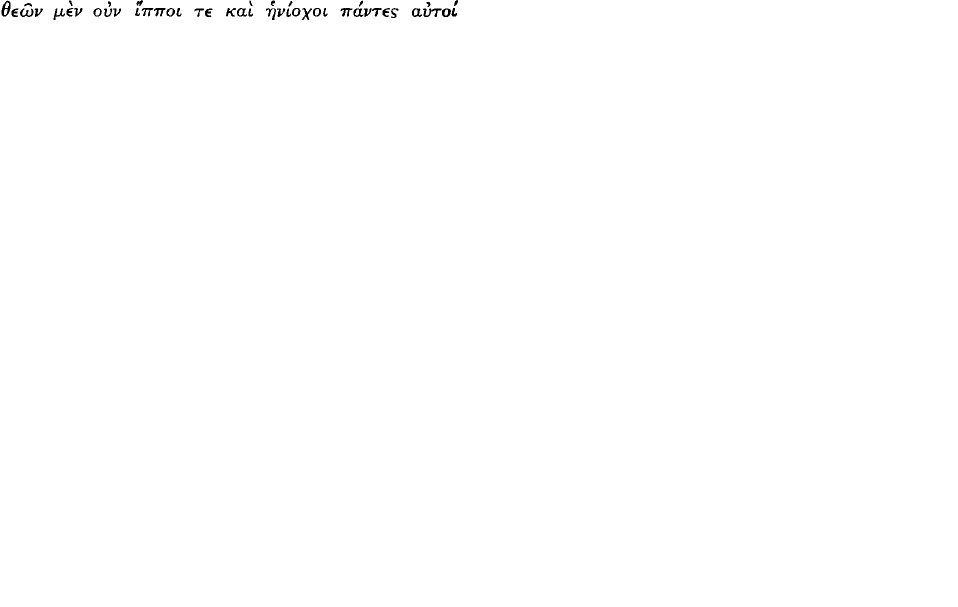
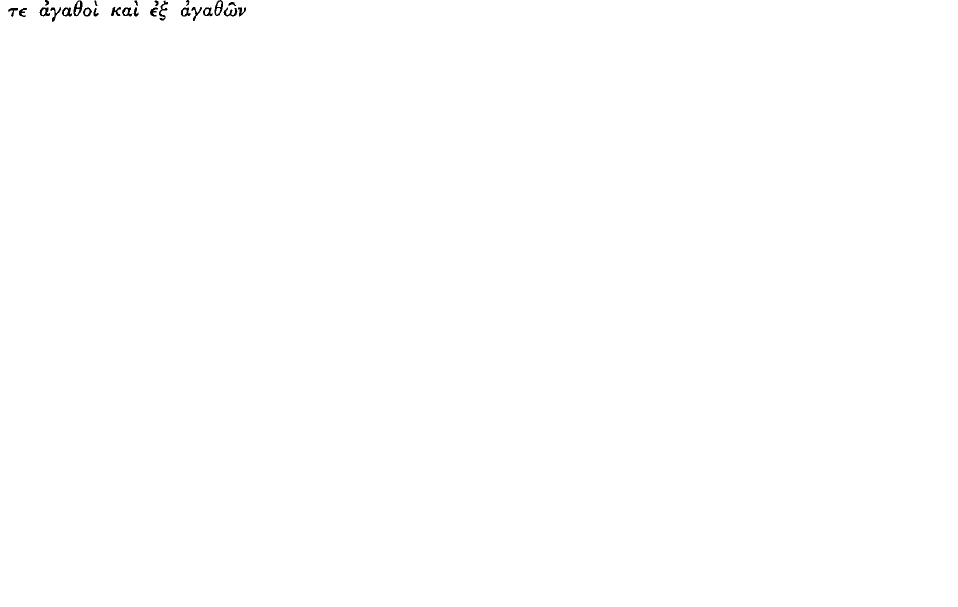 ). In the case of the other souls whom Plato calls daimones, and among whom our own souls are included, the soul is represented by a charioteer with two horses of which the right one is good but the left one evil (246 b
). In the case of the other souls whom Plato calls daimones, and among whom our own souls are included, the soul is represented by a charioteer with two horses of which the right one is good but the left one evil (246 b 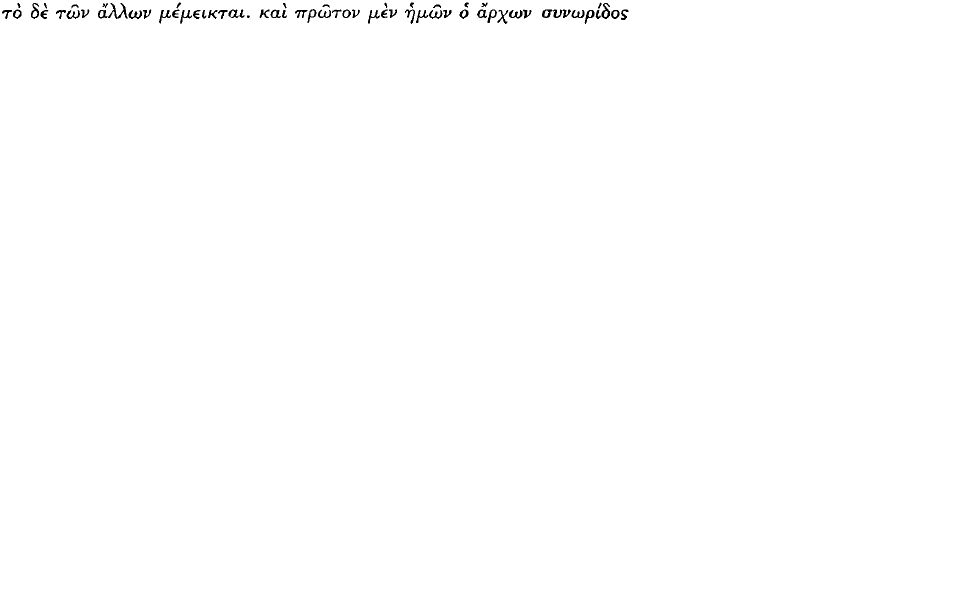
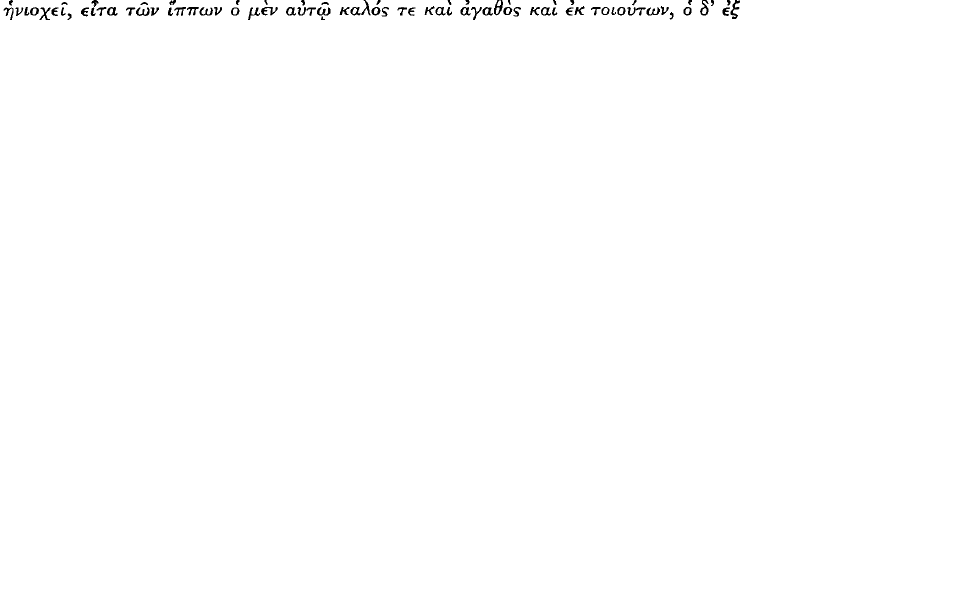
 ). It is generally agreed that the right and left horses represent
). It is generally agreed that the right and left horses represent 
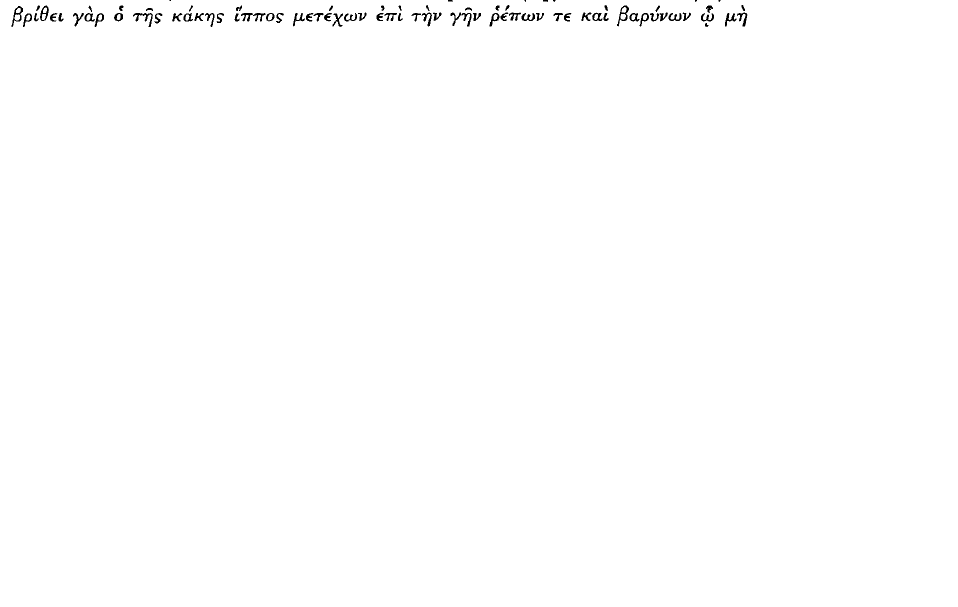
 Plato divides the daimones into three main groups: those who succeed in beholding the Forms though with difficulty; those whose vision is only partial; those, finally, who fail to see the Forms at all. Since contemplation of the Forms provides the nourishment by which the wings of the soul are nurtured, those
Plato divides the daimones into three main groups: those who succeed in beholding the Forms though with difficulty; those whose vision is only partial; those, finally, who fail to see the Forms at all. Since contemplation of the Forms provides the nourishment by which the wings of the soul are nurtured, those  (Porson) is almost universally adopted. However,
(Porson) is almost universally adopted. However,  (Tucker) is printed in the current Oxford text (1955). Porson's emendation was attacked by Tucker on various grounds: (1) it was palaeographically unsatisfactory, (2) it added an otiose epithet to
(Tucker) is printed in the current Oxford text (1955). Porson's emendation was attacked by Tucker on various grounds: (1) it was palaeographically unsatisfactory, (2) it added an otiose epithet to  but left
but left  unqualified, (3) it involved a ‘scarcely Greek’ use of the participle, and (4) it coined a form in
unqualified, (3) it involved a ‘scarcely Greek’ use of the participle, and (4) it coined a form in  having the unique sense ‘graze’ instead of ‘handle’. My purpose is to defend
having the unique sense ‘graze’ instead of ‘handle’. My purpose is to defend  as the true reading and to explore its contextual significance. I begin by taking Tucker's objections in order.
as the true reading and to explore its contextual significance. I begin by taking Tucker's objections in order.